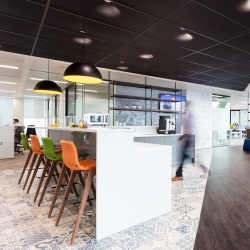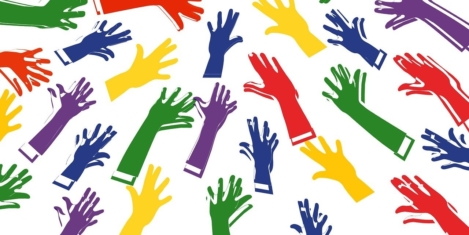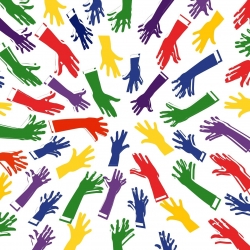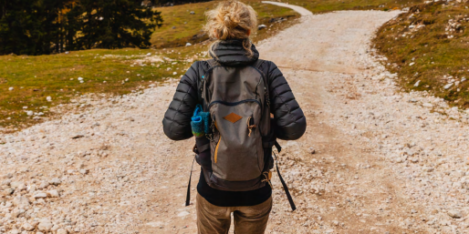To provide the best experiences, we use technologies like cookies to store and/or access device information. Consenting to these technologies will allow us to process data such as browsing behaviour or unique IDs on this site. Not consenting or withdrawing consent, may adversely affect certain features and functions.
The technical storage or access is strictly necessary for the legitimate purpose of enabling the use of a specific service explicitly requested by the subscriber or user, or for the sole purpose of carrying out the transmission of a communication over an electronic communications network.
The technical storage or access is necessary for the legitimate purpose of storing preferences that are not requested by the subscriber or user.
The technical storage or access that is used exclusively for statistical purposes.
The technical storage or access that is used exclusively for anonymous statistical purposes. Without a subpoena, voluntary compliance on the part of your Internet Service Provider, or additional records from a third party, information stored or retrieved for this purpose alone cannot usually be used to identify you.
The technical storage or access is required to create user profiles to send advertising, or to track the user on a website or across several websites for similar marketing purposes.
 Most businesses were ill-prepared to deal with the pandemic and muddled though the challenges stemming from it, according to new report ‘Resilience reimagined: a practical guide for organisations’, produced by Cranfield University, in partnership with the National Preparedness Commission (NPC) and Deloitte. (more…)
Most businesses were ill-prepared to deal with the pandemic and muddled though the challenges stemming from it, according to new report ‘Resilience reimagined: a practical guide for organisations’, produced by Cranfield University, in partnership with the National Preparedness Commission (NPC) and Deloitte. (more…)






 A new report from KPMG suggests that half of major corporations do not expect to see a return to any sort of ‘normality’ until 2022 when half of the general population has been vaccinated. The report also claims that there has been a steep decline in the appetite of the global executives who took part in the survey for office downsizing as the firms reconsider the need for in-person business to resume when countries emerge from the pandemic.
A new report from KPMG suggests that half of major corporations do not expect to see a return to any sort of ‘normality’ until 2022 when half of the general population has been vaccinated. The report also claims that there has been a steep decline in the appetite of the global executives who took part in the survey for office downsizing as the firms reconsider the need for in-person business to resume when countries emerge from the pandemic. 
 The
The 
 Many organisations make bold claims about their zero carbon ambitions. Even if they don’t, most have sustainability statements. Yet the environmental impact of office furniture and sophisticated approaches to sustainable office design seem to be way down the ‘pecking order’. During the last year, we have read considerable commentary about the office – starting with its death but moving onto predictions of the ‘new dawn’ with more versatile and healthier workspaces.
Many organisations make bold claims about their zero carbon ambitions. Even if they don’t, most have sustainability statements. Yet the environmental impact of office furniture and sophisticated approaches to sustainable office design seem to be way down the ‘pecking order’. During the last year, we have read considerable commentary about the office – starting with its death but moving onto predictions of the ‘new dawn’ with more versatile and healthier workspaces. 
 You may have heard it said that any idea repeated often enough develops some form of legitimacy. We’ve had plenty of reason to reflect on whether this notion is true or nor over the past year, especially as all-encompassing pronouncements about the future of work have proliferated and intensified. The problem is exacerbated by the fact that around 80 percent of people
You may have heard it said that any idea repeated often enough develops some form of legitimacy. We’ve had plenty of reason to reflect on whether this notion is true or nor over the past year, especially as all-encompassing pronouncements about the future of work have proliferated and intensified. The problem is exacerbated by the fact that around 80 percent of people 
 During the pandemic, 1 in 4 (25 percent) employees say they’ve had no wellbeing check-ins from their workplace. The research from
During the pandemic, 1 in 4 (25 percent) employees say they’ve had no wellbeing check-ins from their workplace. The research from 
 The UK COVID-19 vaccination
The UK COVID-19 vaccination 
 The COVID-19 pandemic has brought anxiety to many, but people are positive about their work, claims a new survey from
The COVID-19 pandemic has brought anxiety to many, but people are positive about their work, claims a new survey from 
 Two and a half million Brits are expected to be unemployed this year after the fall out of the pandemic. A concern for many has been how disabled people will fare with the aftermath. The unemployment rate for people with disabilities is more than twice those who are able bodied.
Two and a half million Brits are expected to be unemployed this year after the fall out of the pandemic. A concern for many has been how disabled people will fare with the aftermath. The unemployment rate for people with disabilities is more than twice those who are able bodied. 
 The COVID-19 pandemic is driving a fundamental shift in the way companies operate, accelerating the need for an adaptable and agile workforce to drive business success. According to
The COVID-19 pandemic is driving a fundamental shift in the way companies operate, accelerating the need for an adaptable and agile workforce to drive business success. According to 
 The ongoing Covid-19 pandemic has heightened existing feelings of loneliness and isolation among people aged 55 and over, according to a new report by housing provider
The ongoing Covid-19 pandemic has heightened existing feelings of loneliness and isolation among people aged 55 and over, according to a new report by housing provider 







April 1, 2021
Finding a new sense of purpose in the way we all do business
by David Lineen • Comment, Environment, Property, Wellbeing